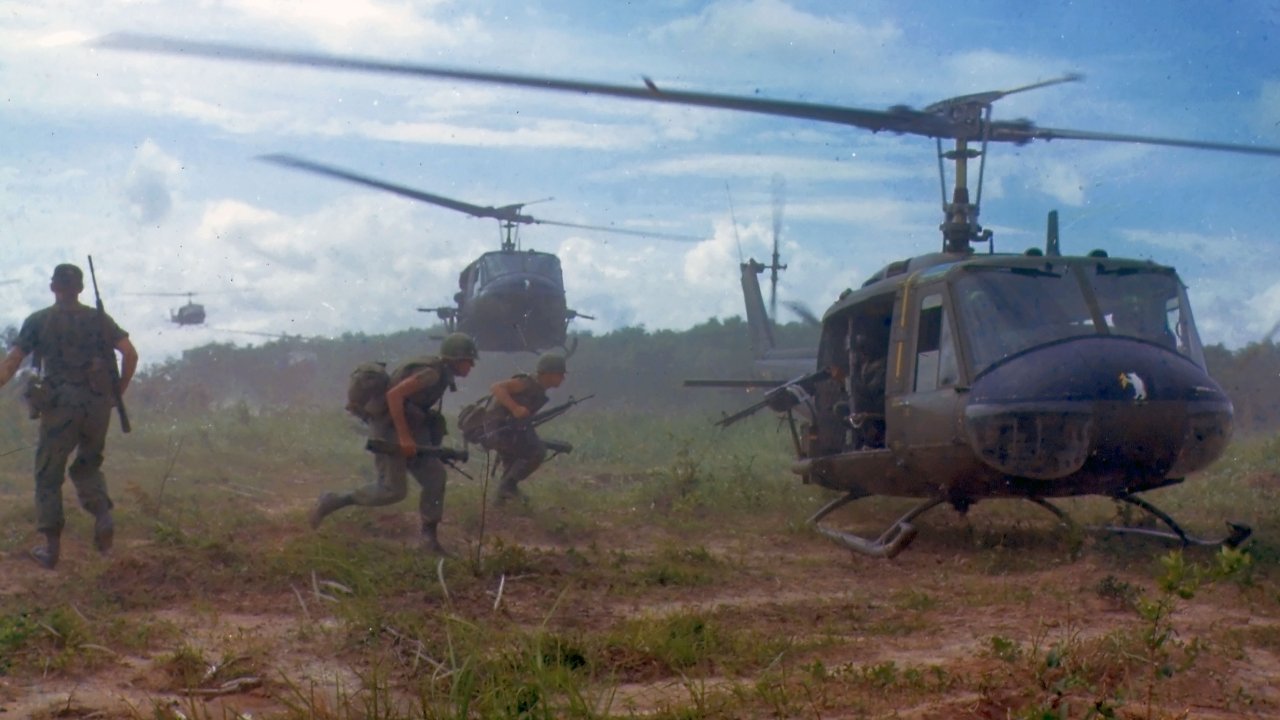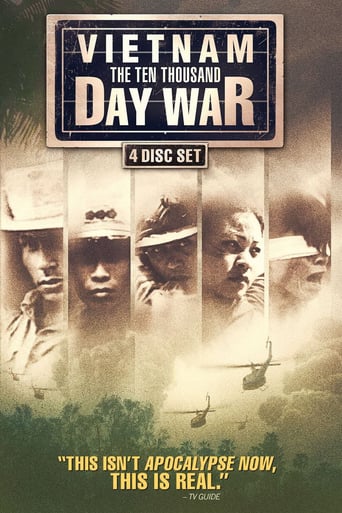

"Vietnam: The Ten Thousand Day War" is a 26-part series and still one of the best documentary series on the Vietnam War. This Canadian production is well-written and well-produced and gives a succinct though comprehensive narrative in chronological order of the events in Vietnam from 1945 onwards. The series eschews political and social bias or commentary and only relates the facts of the events of the war as they occurred. The series deals only briefly with the First Indochina War of the Vietminh against the French as the main focus is by far America in Vietnam. The series concentrates on the American phase of the war from 1962 through the U.S. military advisory stage to the Tonkin Gulf Incident of 1964 and then the U.S. commitment of the fighting arms of the U.S. armed forces in 1965 when U.S. troops were sent to South Vietnam to engage in battle against the Vietcong guerrillas and the North Vietnamese Army to the U.S. withdrawals of its fighting arms from 1969 to 1973 and the Paris Peace Accords of 1973. Veteran American actor Richard Basehart gives the narration and the fact that the series was made in 1980, only 5 years after the fall of Saigon to the North Vietnamese, makes the events with which it deals seem fresh as they had occurred only in the recent past at the time the series was produced. If one wants a comprehensive history of the U.S. involvement in the Vietnam War, this series is certainly one of the better documentary series to watch.
... View MoreAll The Americans did was try to protect the South Vietnamese from North Vietnamese, Communist Oppression. They gave them every opportunity to defend themselves, with considerable money and sacrifice. Sadly, the South was unable to take advantage of that assistance, and protect themselves. However, that was not the fault of the Americans, nor did it make the effort unworthy.Today, Vietnam is turning to capitalism, and hopefully, they will eventually turn to democracy as well. However, there is no question that South Vietnam would have been far better off if it had never had to deal with Communist oppression in the first place.Ultimately, is is sad that the South was not able to benefit from American assistance, and develop a viable non-communist government. But the Americans can not be blamed for this, and they certainly should not be blamed for trying to do the right thing. Few democracies would exist today, of course, if not for American assistance and intervention.
... View MorePerhaps you have to be foreign to judge another country's version of history. Americans naturally have problems with rather infamous parts of their past, as do Germans or Turks. On the other hand, they should also have greater insight, but that requires more courage and honesty than is common. Peter Davis' "Hearts and Minds" sets a pretty high standard.The Iraq and Afghanistan wars have generated new interest in the Vietnam era, "one of America's most mysterious wars". I agree. But this 1980's series does little to solve the mystery, despite its closeness to the events it describes. What it does rather well, especially from today's point of view, is turn not-so-distant reality into "documentary" fiction. You'll look in vain for the wide spectrum of peace and protest movements the Vietnam war created, fueled by a "youth revolution" that stretched across the globe, and it doesn't demystify the strategic planning behind the "domino theory", the perceived communist threat to such post-WWII allies as the Philippines, Thailand or Japan. It doesn't expose the Gulf of Tonkin incident as the staged event it was (to be fair, maybe unknown at the time). It lacks perspective because it doesn't discuss the aftermath of the war, namely the rise of the Khmer Rouge in Cambodia, to which the American bombing heavily contributed, or the long-term effects of Agent Orange we see even today. It all but disguises the fact that war with Vietnam continued in economic guise after the reunification, seriously hampering the rebuilding of a country ravaged and depopulated by decades of war - instead, we are left with parting images of happy, healthy Vietnamese children, followed by an entire episode to grieve for and with the poor, maltreated American veterans - now where have I seen that before? Curiously, the interviews with the soldiers in last episode offer some of the best glimpses of the true face of any war, attitudes and confessions that are usually turned into Hollywood myths or abstracts, especially by a warlike "superpower" that hasn't experienced war at home for almost 150 years. After all, it's over, why offend anyone. But they're the life blood of history and the main reason why war has such a bad reputation. The series avoids mutilated bodies and common war crimes by both sides, other than the My Lai massacre, but excluding most of the iconic pictures that sparked the Vietnam protests. That's not to say it's all bad. Although it leaves out far too much and looks surprisingly modern in its superficiality, it offers a general war time line as well as nowadays rare interview footage of the political players. To fill in some of the gaps, I recommend "Secrets of War: Vietnam" (1998, narrated by Charlton Heston) and "Sir! No, Sir!" (2005) on the Vietnam GI Anti-War movement. The measuring gage, of course, is "Hearts and Minds" (1974), and not for its grisly images, but for the variety of snapshots from the era it has to offer. Documentaries are not only made to explore, but also to shape the perception of the past.
... View MoreWithout question the finest most thorough documentary about the entire Vietnam conflict. The years from 1945 until the fall of Saigon in 1975 are covered with scores of interviews, newsreel footage and photos. Each episode deals with a specific part of the conflict i.e. The Air campaign, The Guerilla war, the American homefront, The French involvement etc. Narrated superbly by Richard Basehart this is to the Vietnam conflict what Ken Burns The Civil War was to that conflict.
... View More